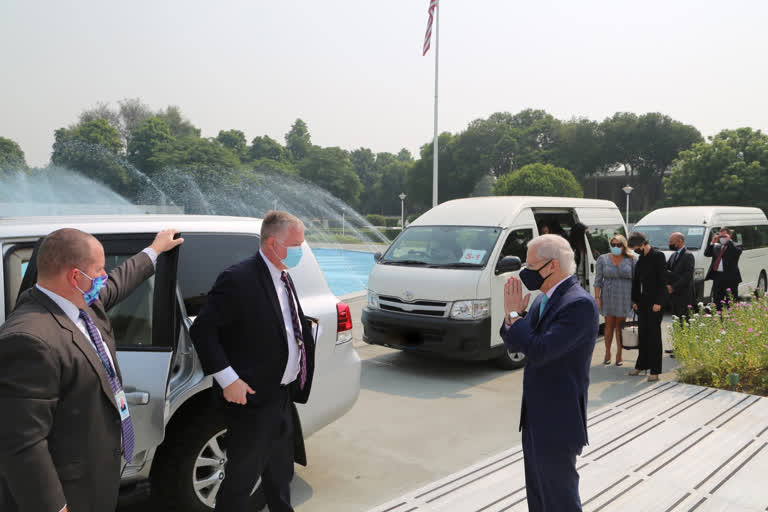New Delhi: US Deputy Secretary of State Stephen Biegun commenced his three-day visit to India on Monday. On his arrival, he was received by U.S. Ambassador to India Kenneth Juster in New Delhi.
Juster took to twitter and wrote, “Pleased to welcome U.S. Deputy Secretary of State Stephen Biegun to New Delhi. I’m looking forward to productive meetings over the next few days.
-
Pleased to welcome U.S. Deputy Secretary of State Stephen Biegun to New Delhi. I’m looking forward to productive meetings over the next few days. pic.twitter.com/Kfk2lC2tDR
— Ken Juster (@USAmbIndia) October 12, 2020 " class="align-text-top noRightClick twitterSection" data="
">Pleased to welcome U.S. Deputy Secretary of State Stephen Biegun to New Delhi. I’m looking forward to productive meetings over the next few days. pic.twitter.com/Kfk2lC2tDR
— Ken Juster (@USAmbIndia) October 12, 2020Pleased to welcome U.S. Deputy Secretary of State Stephen Biegun to New Delhi. I’m looking forward to productive meetings over the next few days. pic.twitter.com/Kfk2lC2tDR
— Ken Juster (@USAmbIndia) October 12, 2020
Meanwhile, Foreign Secretary Harsh Vardhan Shringla participated alongside U.S Deputy Secretary of State Stephen Biegun in the opening session of the fourth India-US Forum.
"Foreign Secretary @harshvshringla participated along with U.S. Deputy Secretary of State Stephen Biegun in the opening session of the 4th India-US Forum”, External Affairs Ministry spokesperson Anurag Srivastava said on Monday.
-
Foreign Secretary @harshvshringla participated alongwith U.S. Deputy Secretary of State Stephen Biegun in the opening session of the 4th India-US Forum @USAmbIndia @State_SCA @IndianEmbassyUS pic.twitter.com/V8Hlt7vhIk
— Anurag Srivastava (@MEAIndia) October 12, 2020 " class="align-text-top noRightClick twitterSection" data="
">Foreign Secretary @harshvshringla participated alongwith U.S. Deputy Secretary of State Stephen Biegun in the opening session of the 4th India-US Forum @USAmbIndia @State_SCA @IndianEmbassyUS pic.twitter.com/V8Hlt7vhIk
— Anurag Srivastava (@MEAIndia) October 12, 2020Foreign Secretary @harshvshringla participated alongwith U.S. Deputy Secretary of State Stephen Biegun in the opening session of the 4th India-US Forum @USAmbIndia @State_SCA @IndianEmbassyUS pic.twitter.com/V8Hlt7vhIk
— Anurag Srivastava (@MEAIndia) October 12, 2020
However, talks on establishing resilient supply chains in a post-covid-19 world, dealing with the rise of China and ways to further deepen bilateral ties including the signing of a strategic pact to share geospatial defence intelligence are some of the key agenda to be discussed during Biegun’s stay in India.
Earlier today, External Affairs Minister S Jaishankar met Biegun and both the leaders exchanged views on world politics and regional issues.
“Pleased to meet US Deputy Secretary of State Stephen Biegun. Useful exchange of views on world politics and regional issues. Appreciated the steady progress of our bilateral cooperation. Confident that our Strategic Partnership would continue to deepen”, EAM Jaishankar tweeted.
The Deputy Secretary is also slated to meet with senior Indian government officials and deliver keynote remarks at the India-US Forum.
Also Read: India, Japan hold strategic dialogue; stress on expanding collaboration in third nations
Biegun’s visit is seen as crucial as the discussions with Indian foreign secretary Harsh Shringla are expected to pave the way for the “2+2" defence and foreign ministerial talks between India and the US – the last major engagement between the two countries before the 3 November presidential polls in the US.
According to sources, it is expected that US State Secretary Mike Pompeo and US Secretary of Defence Mark Esper will attend the “2+2" in person in New Delhi on 26-27 October. This is the third dialogue in the “2+2" format that was established after US President Donald Trump took office in January 2017.
The “2+2" talks agenda of discussion includes the signing of the Basic Exchange and Cooperation Agreement (BECA) that will allow the US to share satellite and other sensor data with India to improve the Indian military’s targeting and navigation capabilities. This is the fourth so-called “foundational agreement" to be signed between India and the US after pacts initiated in 2002 (to safeguard shared military information), 2016 (sharing of logistics) and 2018 (a secure-communication pact). The pacts are a measure of how far India-US ties have progressed in the past two and a half decades – from being known as the 'estranged' democracies to now being seen as “engaged democracies."
Biegun’s visit comes exactly a week after the foreign ministers of India, US, Japan and Australia met in Tokyo last week in person that underlined the importance attached to the “Quad" format.
The grouping of the four democracies is seen as a move to counter a rising China that is spreading its military muscle in the South China Sea, East China Sea, Taiwan Straits and the northern border with India.
The security of open navigational routes in the Indo-Pacific region and the resilience of supply chains were two common themes to recur in discussions of the Quad group that met on 6 October.
The Quadrilateral Security dialogue, also known as Quad, is an informal strategic forum between India, US, Japan and Australia. The strategic alliance was formed to ensure peace and stability in the Indo-Pacific and check China’s expansionist efforts in the region, which has become a major cause of concern for a rules-based order.



